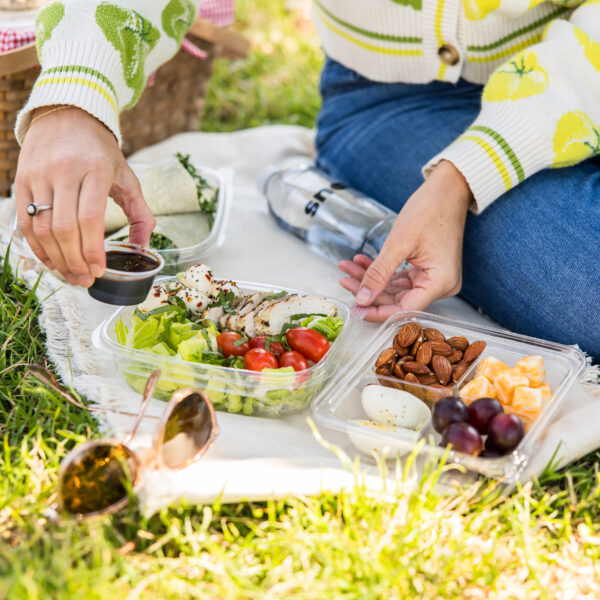We know that 2020 has been A LOT. We’ve all been challenged in ways that we weren’t expecting, and we know that this January 1st will be a bit different than most. Which is why it’s more important than ever to set yourself up for success now — why wait until January?
Here’s how it has usually gone in previous years. It’s January 1st and you’ve resolved to eat healthier, workout, and pay off your debts. You’ve got high hopes for ALL of it, and you’re excited to finally make a change — especially once that vaccine rolls around. But by mid-January, you’re overwhelmed, deflated, and abandoning the best of intentions. Sound familiar?
As humans, we’re programmed to operate in all-or-nothing thinking; that ‘go big or go home’ is the ultimate goal. And when it comes to those goals, we tend to overcommit without knowing what we’re getting ourselves into.
We have a better idea. Give yourself a trial run! But even before that, map out what you’d like to accomplish and be SPECIFIC! I always recommend utilizing SMART goals. That just means making goals that are specific, measurable, achievable, realistic, & time-bound.
Here are a few examples of how you can implement SMART goals:
- Instead of saying “I’m going to eat more vegetables’, you can say ‘I’m going to eat a big salad for lunch Monday through Friday” or “I’m going to prepare 4 different types of veggies on Sunday and incorporate them into my lunch and dinner.”
- Instead of saying “I want to eat healthier”, be specific with what you’re going to implement. You can say “I’m going to build my plate around protein, veggies, and healthy fats every day” or “I’m going to only eat when I’m hungry, and sit down to eat without distraction whenever I’m home.”
By making goals specific, manageable, and timely, you’re much more likely to be successful.
Be Realistic With Your Goals
Here’s some food for thought: if you haven’t been paying any attention to what you’re eating, it’s not a good idea to jump right into keto. Your body will be thrown for a major loop and you’ll be left feeling the effects of making such a drastic change (think irritability, nausea, and headaches — to name a few).
Feeling bad will make you think you’re on the wrong track, and you’ll go back to your old habits. Instead, meet yourself where you’re at by using smaller goals first. If you want more tips for goal setting, head here.
When I say a trial run, I mean it! Don’t put all the pressure on January 1st. Start now instead! Want to do a Whole30 or clean up your eating habits in January? Browse the web or buy a cookbook and make a few of the recipes to find new favorites! Start eating meals that align with your goals. This way, you’ll see which flavors and combinations you like more than others and can readjust as needed.
The benefit of doing things this way? You’ll know what’s actually attainable in January, and what goals you should save for future months. In fact, data shows that almost 80 percent of people abandon New Year’s goals by February. Given that statistic, wouldn’t you rather make smaller changes that actually stick?

To sum it up, here’s how:
- Map out everything you want to accomplish. Be specific! It’s not enough to want to eat healthily — you need to map out how you’ll do it.
- Prioritize your list based on what’s most important to you.
- Take action THIS month. Don’t wait until January. Give yourself a trial run now. Experiment with new recipes or start saving a few dollars each week. By getting started now, you can figure out which goals might be too ambitious, and which are just right.
- Assess what’s working and what’s not. Not all of the goals you set will be realistic, and some might not be right for you at the moment. Keep those in your back pocket for future months when you’re ready.
- Tweak your list for January. Be realistic here. Ideally, you’d only change one thing at a time. At most, I recommend bringing two new habits into your life at once. Your January Whole30 or your new skincare routine might be enough to start. By being honest with yourself and keeping your list of goals realistic and manageable, you’ll be much more likely to make sustainable, long-lasting changes.
Consistency is Key
The key to building new habits (and making them stick) is consistency and repetition. Here’s how our meals can help you with your goals:
- Want to maintain consistency during the busy holiday season but don’t have any dietary restrictions? Our balance plan is perfect for you.
- Planning on a January Whole30 and want to give the meals a test drive? Get a few meals delivered to you each week to see which ones are your favorites ahead of time.
- Want to try the keto diet in January? Start on our keto-friendly or low carb plan today. This will help to slowly wean yourself off a higher carb diet, which will ensure that you don’t shock your body come January.
- Only need a few meals for the week? We’ve got you covered! Choose only the meals you need and leave the rest. Our meals are nourishing, comforting, and designed to fit neatly into your lifestyle!
I’m curious – have you ever done a trial run for a new habit? If not, are you going to try it this year?
If you’re looking to remove common inflammatory foods, give a new healthy habit a test run, or just reset, our Whole30-approved meals work to improve your mood, your digestion, and help give you clearer skin. Check out our Whole30-approved meals today!





Leave a Reply
2 Comments
Hi! Are you meals organic?
Hi Soraida! Our meals are not 100% organic, but we do use some organic ingredients. Our nutrition labels will always tell you when an ingredient we’re using is organic. Hope that helps!